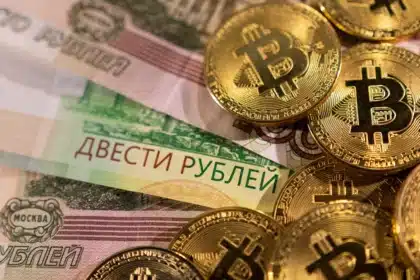South Korea’s Financial Services Commission (FSC) has recently intensified its regulatory efforts by blocking 14 foreign crypto platforms from the Apple App Store, including prominent exchanges such as KuCoin and MEXC. This action, which began on April 11, 2025, is part of the country’s ongoing strategy to enforce stricter control over the rapidly growing cryptocurrency market. The decision signals South Korea’s commitment to ensuring that crypto platforms comply with local financial laws and regulations.
South Korea’s Crypto Crackdown
The recent ban follows a similar action on Google’s Play Store, which targeted the same platforms, including KuCoin and MEXC, starting March 25, 2025. Both tech giants complied with the Financial Intelligence Unit’s (FIU) request to block access to unregistered foreign crypto platforms operating in South Korea. The move effectively prevents users from installing the apps or receiving updates, further tightening restrictions on non-compliant platforms.

The FIU, an agency focused on preventing money laundering and combating terrorist financing, requires foreign crypto service providers to register with it before doing business in South Korea. If they fail to meet this requirement, the platforms face significant penalties, including a fine of up to 50 million Korean won (approximately $35,120) or a prison sentence of up to five years.
The Role of the Financial Intelligence Unit
The FIU’s involvement is crucial in South Korea’s broader effort to regulate the crypto industry and ensure that financial transactions are transparent and secure. The agency has been increasing its oversight, and its decision to block foreign platforms highlights the country’s growing intolerance for unregistered services that circumvent domestic regulations.
According to the FSC, foreign platforms that engage in activities such as accepting payments in Korean won, marketing to Korean users, or offering services in Korean are required to register with the FIU. Non-compliance with these regulations can result in severe consequences for platforms operating in South Korea without proper approval.
Impact on Major Crypto Platforms
The blocked platforms include some of the most well-known exchanges in the crypto space, such as KuCoin and MEXC. These exchanges are now unable to offer their services to new users in South Korea, and existing users will no longer be able to receive app updates. This represents a significant blow to these platforms, which have established a strong user base in South Korea — one of the world’s largest markets for cryptocurrency trading.
The recent ban also targeted other exchanges, such as Poloniex and BitMart, in addition to KuCoin and MEXC. However, these exchanges have yet to issue statements regarding their plans to comply with South Korea’s regulatory requirements.
 South Korea’s Push for Institutional Crypto Investment
South Korea’s Push for Institutional Crypto Investment
At the same time, the authorities are gradually stepping up restrictions on foreign platforms, there is an attempt to gradually liberalize the domestic cryptocurrency to institutional investors. South Korea ‘s local banks and exchanges are set for institutional clients as the government continues to ease the restrictions state on the corporate purchases of digital assets.
One of the immediate steps that have been discussed in the past few months have seen major south Korean financial institutions requesting for more relaxing regulations so that they can increase their partnerships with cryptocurrency firms. The focus on this category has increased over the years due to the realization that digital assets are real investment opportunities for institutional clients.
Escalating Crypto-Related Scandals in South Korea
The government’s crackdown on foreign crypto platforms comes amid several high-profile scandals involving cryptocurrency in South Korea. One of the most notable cases involved a civil servant who embezzled nearly 500 million won ($342,000) in public funds to trade crypto. Some of the misappropriated funds were reportedly used to purchase cryptocurrency with flood recovery donations.
Additionally, a former lawmaker was recently cleared of charges after being accused of hiding crypto assets. A recent investigation also revealed that a crypto mining operation in Gwangju was actually a front for illegal gambling, funneling over 140 million won ($95,000) in illicit funds.
These incidents have prompted the government to further tighten its crypto regulations, ensuring that both domestic and foreign platforms comply with the nation’s laws.
The Future of South Korea’s Crypto Task Force
Early this year, South Korea suggested a way to make its cryptocurrency investigation team persistent in the same year. This new unit would further enhance the work done since the task force was formed in July 2023. The additional unit would be more powerful and well-funded to address these types of criminal activities and intensify supervision of foreign-based trading platforms.
This decision can be attributed to South Korea’s efforts in containing the challenges emanating from the growing mushrooming crypt currency market. Thus, strengthening the government’s regulatory power, South Korea seeks to create favorable conditions in the digital asset market both for domestic and foreign investors.
Conclusion
South Korea’s recent actions to block unregistered foreign crypto platforms demonstrate the country’s firm commitment to regulating the digital asset sector. While the crackdown targets platforms like KuCoin and MEXC, the broader goal is to ensure that crypto businesses operate in full compliance with South Korean financial laws. The country’s regulatory framework aims to foster trust and transparency in the industry, ensuring that both local and international users can engage with crypto services safely and securely.
Frequently Asked Questions (FAQ)
1- Why is South Korea blocking crypto platforms like KuCoin and MEXC?
South Korea is blocking these platforms for operating without proper registration with local authorities.
2- What penalties do unregistered crypto platforms face in South Korea?
Unregistered platforms face fines up to 50 million won or up to five years in prison.
3- How does the crypto crackdown affect users in South Korea?
Users can no longer install or update apps from unregistered crypto platforms.
4- What is South Korea’s plan for crypto regulation moving forward?
South Korea plans to expand its crypto task force to enhance regulatory enforcement and tackle crypto crimes.
Appendix Glossary of Key Terms
Crypto Platforms: Online services that facilitate the buying, selling, and trading of digital currencies.
FIU (Financial Intelligence Unit): A government agency responsible for monitoring and preventing financial crimes, such as money laundering.
Virtual Asset Service Providers (VASP): Entities offering services related to cryptocurrency or digital assets.
Blockchain: A decentralized digital ledger that records transactions across multiple computers.
Decentralized Finance (DeFi): A financial system built on blockchain technology, operating without traditional financial intermediaries.
Market Capitalization: The total value of a cryptocurrency, calculated by multiplying its current price by the total supply of coins.
Compliance: Adhering to the laws, regulations, and standards set by regulatory bodies.




 South Korea’s Push for Institutional Crypto Investment
South Korea’s Push for Institutional Crypto Investment
























